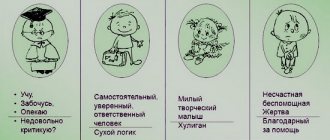Berne's transactional analysis helps people understand the causes of problems that manifest themselves during communication. The American psychologist identified three ego states that determine the psychology of behavior, human health and overall quality of life. Eric Berne analyzed communication and divided it into transactions, hence the name of the analysis. In psychotherapy, ego states are studied - systems of feelings and ideas that manifest themselves through different patterns of behavior. When communicating, a person takes a specific position, and it depends on this how he will react to what is happening, as well as how his interlocutors will perceive him.
Reluctance to take responsibility
Every cause has its effect. If you tell a friend “you’re acting like a child,” and you don’t understand why an adult would allow himself to behave like that, then just believe that the person has a reason for this. Which? A person who cannot or does not want to take responsibility will behave like a child. He will run away from real life and try with all his might to live in his fantasy world. Even if you make every effort to return the person to this reality, you may not succeed. Until the individual himself understands that it is time to grow up, all your arguments will not be accepted.
Mental infantilism is an immaturity of thought processes, the main component of which is the avoidance of responsibility and independent decision-making due to delayed mental development. Such people, as a rule, do not have any goals or plans for their future life. Psychological infantilism differs from mental one in that such a person has good abstract thinking, has a good ability to learn, but, for some reason, there was a “disruption” of attitudes. Often such infantilism occurs at the age of 18-20 years, it is during this period that the child’s first adult decisions (enrolling in college, getting a job, etc.) occur.
Recently, social infantilism has become increasingly common - underdevelopment of the personality as an individual due to constant strife in society. An example would be excessive guardianship over one’s child, when the parent’s beloved child has never made independent decisions in his life, and, as an adult, is literally “lost” in the vast world due to a misconception about it. Psychological immaturity creates stereotypical thinking: “My parents took care of me, and other people will.” On a subconscious level, an immature personality is looking for an adult and responsible spouse to partner with, so that he can solve all the problems himself.
Infantile personality disorder is a persistent symptom complex that has been developing in an adult for years and leads to an acute need to satisfy one’s needs through other people.
There are several types of infantilism:
- Mental. Caused by mental incompetence due to delayed mental development;
- Psychological. Formed under the influence of stressful situations;
- Physiological. Impaired physical development due to pregnancy pathology or intrauterine infection.
Adult
Adult – “expedient”, “useful”. Outwardly, a person with his entire appearance makes it clear that he is focused on the object and the topic of the conversation: he leans forward with interest, looks directly at the object, his eyes are slightly widened or narrowed. Attention and interest are written on the face. The following expressions predominate:
- I probably didn't express myself correctly, since you didn't understand me.
- Let's discuss this.
- Please repeat again.
- How do you like this proposal?
In general, he is an adult: he solves problem situations productively, and thinks sensibly. It’s a pleasure to deal with him, of course, as an adult.
An adult is the most objective position. It does not depend on the script laid down in childhood. This is something that a person has learned himself. An adult acts according to the “here and now” principle. Rationally solves the current problem. You can develop this role endlessly, throughout your life.
Complete blocking of an adult leads to the inability to respond to changes in the world. Human thinking is responsible for this role; it is a personal feature of collecting and analyzing information. A developed adult decides which stereotypes of the child and parent to turn off in the current situation and which to turn on.
Transactional analysis
The twentieth century gave the world many outstanding people. One of them is the American psychologist and psychiatrist Eric Berne (1910-1970), the creator of transactional analysis. His theory has become a separate popular trend in psychology, incorporating the ideas of psychoanalysis, behaviorism, and cognitive psychology.
E. Berne presented the theory of transactional analysis in a language accessible to readers in several works. Many of them have been translated into Russian and have remained bestsellers for more than half a century. His most famous books are: “Games People Play”, “People Who Play Games”, “Beyond Games and Scripts”.
And in the book “Transactional analysis in psychotherapy. Systemic Individual and Social Psychiatry” contains the entire coherent theory of E. Bern, and not only its main blocks, developed in subsequent publications - the analysis of games and scenarios - but also aspects that the author does not set out in his other books.
E. Bern
In a practical sense, transactional analysis is a system for correcting the behavior of individuals, couples and small groups. After familiarizing yourself with the works of E. Bern and adopting his concept, you can independently adjust your behavior so as to improve relationships with the people around you and yourself.
The central concept of the theory is transaction - the act of interaction between two individuals entering into communication, the basis of interpersonal relationships.
It is difficult to literally translate the word “transaction” from English, but in terms of meaning it is most often interpreted as “interaction,” although a transaction is not the entire interaction, but only its element, a unit of communication. Human interactions consist of many transactions.
A transaction includes a stimulus and a response. One person says something (stimulus), and the second person responds something (response).
A simple transaction example:
- Can I help you? (stimulus) - No, thank you, I’ll do it myself. (reaction)
If interaction were based only on the “stimulus-response” scheme, there would not be such a variety of human relationships. Why does a person behave differently with different people and reveal himself in a special way in his interactions?
The fact is that when communicating, one individual comes into contact with another person as a person with a person, or more precisely, some part of his personality with a part of the personality of another person.
Brief essence of the theory
In the theory of transactional analysis, the unit of communication is transactions (stimulus and response). The Parent-Parent line is needed for casual conversations and gossip. Adult-Adult – work, business relationships. Child-Child – for feelings and love. When transactions coincide, communication lasts a long time. Violation of transactions causes disagreements, conflicts and inadequate psychological interaction (guardianship, tyranny, manipulation, suppression, whims).
Child-parent relationships in the family
Healthy parent-child relationships in the family contain two components. Love is the first ingredient. The attitude towards the baby in the family should be based, first of all, on love for him, and not on control and educational methods of influence. The child needs to feel that mom and dad feel love for him simply because he exists, and not for his behavior, actions or good grades. The love of parents is the guarantee that the baby will grow up with a normal level of self-esteem, a sense of self-esteem and trust in the world around him. Children who are simply loved accept themselves exactly as they really are, which is of great importance in their entire subsequent life. After all, if you enter adulthood considering your personality “unworthy” or “bad,” your chances of a decent and successful life are reduced to zero.
The second component of the parent-child relationship is freedom of choice. Providing it to a child is often much more difficult than love. It is quite difficult, and sometimes very scary, for parents to allow their child to make his own choice. Since they are always confident that they know better what to do, but the child wants to do it his own way only out of pure stubbornness. However, freedom of choice should be distinguished from lack of control and permissiveness.
Even if the baby feels love, excessive control on the part of dad and mom leads to the risk of developing various forms of addiction. Reckless parental love, enhanced by total control, is an explosive mixture. This “cocktail” suffocates and prevents you from breathing. Women with increased anxiety and over-concern are prone to such overprotection. They control every step of the child, every new hobby. As a result, the baby can grow up either fragile and vulnerable, unable to withstand any difficulties in life, or simply try to avoid such love by any means. The nature of family relationships, based on total control, as most psychologists claim, causes children to often escape from reality into “chemical dependence,” mainly drug addiction.
Control, coupled with parental dislike, can destroy a child’s personality, which can ultimately lead to suicide.
Excessive freedom given to a child, combined with dislike, provides an opportunity for the formation of a child's personality, but at the same time leads to a great risk of physical injury. Such relationships are most often observed in dysfunctional families, such as families of alcoholics or drug addicts. In such family unions, children receive almost absolute freedom of choice, since, in principle, no one needs them. In such relationships, children have a high probability of dying, but at the same time, children have the opportunity to grow into independent, purposeful individuals.
For the purpose of educational measures in family relationships, parents can turn to various methods of influence, such as encouraging or punishing the child, the desire to demonstrate behavior patterns by their own example. Praise from parents will be more effective if the child has a warm, friendly relationship with them, and, conversely, if the relationship between the participants in the seminal process is cold and indifferent, then praise will provide practically no incentive for the baby. Thanks to the use of encouraging parenting methods, the development of a child as an individual can either be accelerated and made more successful, or slowed down. You should not abuse punishment in the process of education. It should be used only if it is practically impossible to change the child’s behavior in any other way. If there is a need for punishment to increase the educational response, the punishment should follow immediately after the offense. Very harsh punishments should not be abused, as they can cause fear and anger in the child. Children who are often shouted at and constantly punished become emotionally indifferent and display increased aggressiveness.
The psychology of family relationships comes down to the fact that everything that happens to a child is entirely the merit of his parents. Therefore, parents must learn that after the birth of a child, they have the opportunity to either help the child in the processes of socialization, personality development, learning, etc., or, conversely, hinder it. Refusal to participate in raising children is also a kind of contribution to his future. But whether it will be positive or bad, time will tell.
Examples of role mismatch
In life, role discrepancies are not uncommon, which is why conflicts arise. Here's what it might look like in different areas.
Family
The husband, from the position of an adult, asks: “Darling, do you know where my tie is?” The wife, from the position of a parent, replies: “Where you left him. How small! "
In sales
The buyer, from the perspective of an adult, asks: “How much does this dress cost?” The seller answers irritably from the position of a parent: “You don’t have eyes, can’t you see it yourself?”
At work
A young specialist turns to a colleague or manager for help from the position of an adult: “Could you tell me which algorithm and program is best to use to solve this problem?” And in response he hears an irritated parent: “It’s high time to understand and know this yourself.”
In all three cases, an unprepared person who does not know role theory will also begin to play the role of a parent. As a result, endless reproaches and complaints will pour in from both sides. But if you learn to conduct transactional analysis and identify the positions of communication partners, then you can prevent conflicts in time.
I am a Parent
In the “I-Parent” state, a person copies parental patterns of behavior or images of authorities. Feels, thinks, conducts a conversation and reacts to what is happening in the same way as his parents did in his childhood.
According to Berne, the controlling state of the “Parent” performs the function of conscience and influences a person even in those moments when his external behavior is determined by the states of the Adult or the Child. Often, the “Parent” state is used as a model when raising one’s own children. Therefore, a new parent, as a rule, behaves in the same way as his parents behaved with him. If he was scolded for breaking plates, he will soon begin to scold his children. He will have this reaction automatically; he needs to learn to stop himself and turn on his inner Adult.
"Parent" manifests itself in our ability to do things automatically, in common phrases and in manners. He likes to state: “It is impossible,” “It is necessary,” “It must be.”
What happens if the “I-Parent” ego becomes dominant over the years?
A person whose state is strictly dominated by the ego-parent easily goes to the other extreme: he tries to control the situation everywhere and always. In case of failure, he reproaches and nags himself for any reason, in everything that happens to him, he looks for and finds his guilt.
If such a scenario prevails for years and decades, it becomes the cause of psychosomatic disorders. In this case, the “I-Parent” state manifests itself as destructive and proceeds with serious consequences. As long as the parent exists, the individual will not be able to escape from his controlling influence at the level of parental programs-instructions laid down in childhood. The only way to break out of the shackles is to rewrite the outdated parent programs.
Controlling and Caring Parent
A caring Parent - "living" in you or in others - is one of the happiest states that a person can manifest and experience. He is able to help by forgiving your grievances and imperfections. He finds pleasure in this, so such help will always be on time and is perceived naturally, without tension. All that a Caring Parent requires in return is a little attention to his person.
I am the Controlling Parent
The Controlling Parent always and everywhere strives to “knock out the wedge with the wedge”
A person in this state will again and again draw attention to your mistakes and weaknesses, emphasize his superiority and guide you on the right path with or without reason.
How ego states work
All three positions are important, so don't try to stick to just one option. The main function of the “Child” ego state is to dream and wish, to enjoy life. This position helps you create and generate ideas.
The functions of the Parent are to take care of themselves and loved ones, teach, and also control the process of activity. The adult ego state is responsible for the ability to negotiate and adapt to the situation, look at things realistically, assess prospects sensibly and look for ways to implement plans.
It is worth paying attention to how a person usually achieves his goals. The child finds something he likes and gets excited about a new idea. The adult assesses the situation, begins to make plans and thinks about how to make the dream come true. The parent controls the process and monitors the results, reminding them what needs to be done. He can criticize or praise depending on the situation.
Remember your childhood
Trauma that occurs to a person at a young age can leave an impact for the rest of his life. If in childhood one of the person’s loved ones died, or the person suddenly realized that he was not cared for and was not loved, then, growing up, such a person will try all his life to overcome his inferiority complex. A person will demand love from everyone around him.
Have you noticed cases when parents behave like children? Probably, these adults are not just playing around, they really feel like kids who want warmth and care. But the fact is that when becoming a parent, a person should take care of the baby, and not look for warmth from others. A person must understand that childhood traumas should be outgrown, and not drag their baggage throughout life. If you cannot cope with mental anguish on your own, then a person can turn to a qualified psychologist who will help find a way out of the most difficult situation.
Child
Child – “I want”, “I like”. There is no need to describe anything here, just remember the classic behavioral characteristics of children: true emotions are never hidden, they dictate words and actions. What else do children do? They are capricious, hooligan, cry, laugh, get scared, get offended. Their vocabulary differs in the following expressions:
- I want, I don’t want;
- Amazing;
- tired;
- when will this all end;
- to hell with it all;
- I will never agree;
- I love you madly.
That is, the child is ruled by emotions and feelings, which is immediately reflected in behavior and communication. The child is responsible for spontaneity, ingenuity, charm (natural child), but at the same time he can be capricious, aggressive, rebellious, whiny, touchy (adaptive child).
How to activate the deep potential of the psyche?
Download the free book
“Reserves of the human psyche: a sign system of communication with the unconscious”
Your name:
Stuck in childhood? Have you also encountered people whose behavior does not “match” their real age and position in society? What is it called when an adult behaves like a small child, completely copies children's rash actions and decisions? What do you call a person who doesn't want to grow up? Why are there more such individuals and what is the reason for this?
The condition when a person does not want to grow up and behaves like a child is called infantilism.
A person in this form is an infantile.
The most common form of this psychological disorder is socio-psychological infantilism, which is very common in ordinary families. Moreover, as a rule, such families actually have a small child. Why is this happening? And who is more susceptible to deliberate infantilism?
Problem and signs of imbalance
A person can achieve success and prosperity if the three components of the ego interact harmoniously in him. Each state should account for approximately 30% of his time.
If you know the principles of transaction, then you can include a child, adult or parent in the right situation so that communication goes according to the desired scenario.
Unfortunately, not everyone has this balance. This leads to various communication problems. Most often, an individual is dominated by a parent or a child.
The child cannot make adult decisions, is late for work, blames others for failures, and gets offended.
The parent constantly teaches his other half, friends, partners.
These excesses negatively affect, first of all, the person himself. Imbalance problems are expressed as follows:
Child
If there is little child in a person, then she does not experience spontaneous desires, joy, or emotions. A child is a piece of childhood that remains with an individual for life.
Bern believes that this side is the most valuable. It allows you to remain spontaneous, delighted, and develop your creative potential.
The expressed side of the child, on the contrary, makes the individual irresponsible, undisciplined, and unable to achieve goals. He only wants to play, receive, but not give.
A depressed or rebellious child is very touchy and prone to depression. He needs parental care, depends on other people's opinions, and has low self-esteem.
If the ego-child is very dominant, then this becomes a serious problem. A person tends to blame other people for failures, does not draw conclusions from his mistakes, and accumulates grievances. These grievances and disappointments lead to depression, depression, and suicidal thoughts.
Hypertrophied parent
This is usually a boring, grumbling, lecturing person.
He does not recognize other people's opinions and criticizes. In relation to himself and others he expresses inflated demands, that is, he is a perfectionist.
The ego-parent tries to constantly control the situation and blames himself for failures. This side of personality that is too pronounced often becomes the cause of mental disorders. This can be avoided if you consciously change the script prescribed in childhood.
Adult problem
The problem for adults is that this side shows up too rarely. Not everyone is able to adequately assess reality, make the right decision, accept constructive criticism, or compromise.
True, the condition of an adult can and should be developed and increased. For example, a person experiences resentment as a result of a conflict. He should analyze the situation and understand whether the interlocutor really wanted to offend him or whether the ego-child was emotionally hurt.
Often, skilled manipulators try to evoke the child's emotions in order to achieve their goal.
The next time a conflict situation arises, you need to “turn on” the adult and “turn off” the child, that is, not fall for the manipulator’s hook.
Thus, a person can be considered mature if a balance has been achieved between the three sides of the ego. The immaturity of one side and the dominance of the other become a source of psychological problems.
Three ego states. Your first selves:
Our interesting VKontakte group:
Child
This state contains an echo of our childhood - it contains the feelings and needs that we experienced when we were children. This is a manifestation of our inner reality as it was before the age of 6-8.
The key word of this inner reality is “I want!”: I want to play, ride on a swing, eat ice cream... In its positive manifestation, this state gives a feeling of grown wings, encouragement, inspiration. When you want to rejoice in this world, scream with happiness, run happily somewhere.
Wanting only to have fun and play, the child is not interested in the consequences of his behavior. Moreover, he is not involved in any planning, formation, or distribution of resources.
There are no prohibitions or social norms for the child’s condition. More precisely, he does not understand and does not want to understand what it is. “Take it all out and put it in” for him. How exactly you “take it out” and how you “put it in” is not his business.
When a child is faced with a prohibition, with the impossibility of fulfilling his “I want”, protests, resentments, whims, crying begin - the negative aspect of this ego state manifests itself.
Afterword
What is the difference between a constructive business conflict and a destructive one? In constructive, people discuss contradictions and try to understand the opposite side for the sake of a common solution and clarification of the truth. In a destructive argument, people try to defend their point of view and win. But is it possible to win? Are there any winners in a broken family, a layoff, or a fight? No. Each side will feel sorry for itself and consider itself betrayed.
The inability to psychologically competently resolve conflicts and be flexible in roles leads to relationships becoming chronically emotionally tense. As a result, they either fall apart, or the participants develop psychosomatic illnesses and neuroses. Berne's theory is a useful basis for studying the problem of conflicts (in the family, at work, in any interpersonal interaction) and their resolution.
The consequences of different parenting styles and how to mitigate them
The parent-child relationship is influenced by several factors:
Personal experience of raising parents themselves. In adulthood, people bring the disadvantages and advantages of the educational process that existed in childhood
For example, the appearance of younger family members was assessed as a negative phenomenon, because all the parents' attention was focused on the youngest. There is an idealization of childhood, excessive guardianship, and a desire to prolong the child’s childhood.
The result is a restriction of independence, the development of a consumer attitude and selfishness. Awareness of the mistake comes after a consultation, during which parents are advised to give more freedom to their children, understanding the difficulties encountered on the path of personal growth. Children make their own decisions, parents support them, regardless of the correctness of the choice made. Parents' aspirations that were not realized in childhood - lack of achievements. This internal attitude hinders the child’s social adaptation; he is forced to spend more time at home and pay attention to family members. The result is that the teenager becomes distant and spends a lot of time outside the home with strangers. The psychologist’s goal is to identify parents’ children’s problems, make them aware of their own unrealized plans, and perhaps confront them with the fact that it is never too late to engage in any type of activity. This approach shifts the parents' attention to themselves, freeing the child from constant control. Attachment. The fear of being alone forces the mother or father to demand the child's attention. Perhaps the parent spent his childhood in a single-parent family, and there was a shortage of male and female attention. The assessment of the pupil’s behavior is based on whether he creates the required emotional sensation for his parents or not. Parents need to work through this aspect, after which the relationship improves. Personal characteristics of adults surrounding the baby. Lack of understanding and flexibility leads to conflicts in adolescence. It's time for adults to stop seeing their son and daughter as small. A bad relationship or lack thereof with the child’s other parent can cause an internal struggle, a desire to change the person by influencing the offspring. The child does not understand what caused the behavior of, for example, the mother, he is forced to psychologically close himself off. Realizing and accepting the situation is the only way out so as not to destroy the relationship with your son or daughter.
The circumstances of the birth of a baby affect the relationship - unwanted pregnancy, difficult childbirth, long-term illness, gender discrepancy with the expected. These moments can cause alienation and rejection by the parent of the child.
Functions
No person can remain in only one state all the time.
When exposed to certain stimuli, certain aspects of the personality are “turned on”
It matters which ego is dominant
All three states are important for interpersonal relationships and perform specific functions:
- The child’s task is creation, the creation of an emotional picture of desires, which will be a stimulus for further development. The child acts spontaneously, creates, gives birth to ideas.
- The task of a parent is care, training, guidance. Monitoring compliance with the rules, providing assistance, constructive criticism.
- The task of an adult is to adapt to the current situation, find a solution, and constructive dialogue. In other words, he must act in accordance with objective reality.
For example, a decision is made as follows:
- the child feels a desire to receive something, feels emotions;
- an adult is looking for ways to solve a problem;
- the parent monitors the correctness of execution, criticizes, guides, evaluates.











